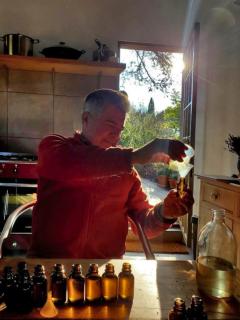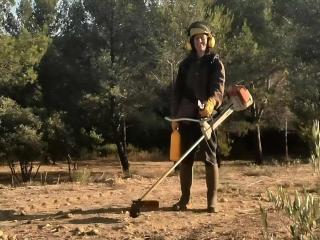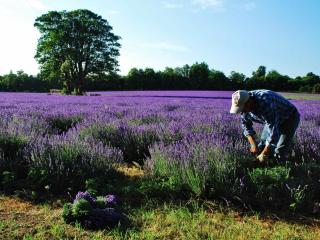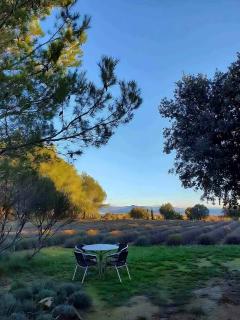

Come with us! We’re going to meet a Franco-British couple who decided to start a lavender farm project near Montpelier. For years, these farmers have been welcoming volunteers. They’re now sharing their experience about WWOOFing from a host’s point of view.
Marie introduces us to two WWOOF hosts, Terri and Bernard. They’ve settled down in the South of France, in the Languedoc region. There, among other things, they grow lavender, and they’re quite good at it!
 Previously, Bernard was a graphic designer, and Terri was a university professor. We had bought the Mas de Villetelle over 20 years ago, but a few years back, Bernard lost his job. We saw it as a sign that the time was right to embark on our “passion” project. Based on Terri’s knowledge in Mediterranean gardening, we decided to level up our practices and launch our very own agricultural business.
Previously, Bernard was a graphic designer, and Terri was a university professor. We had bought the Mas de Villetelle over 20 years ago, but a few years back, Bernard lost his job. We saw it as a sign that the time was right to embark on our “passion” project. Based on Terri’s knowledge in Mediterranean gardening, we decided to level up our practices and launch our very own agricultural business.
We knew it would cost a lot, but we focused on the positive impact it could have on our well-being and health. The gamble paid off! Now we cultivate an area of about 0.5 hectares. We produce lavandin and everlasting, which we then transform into essential oils, balms, and floral waters.
We are currently experimenting with beekeeping and the production of persimmon. Every year, we also organize the Lavender Festival for about ten days. We welcome a thousand people on average! Not only do we show them around the Mas, but we also offer them a unique experience: enjoying a meal at sunset, overlooking the lavender fields.
The keyword for WWOOFing is sharing. For it to work, both sides need their expectations to be fulfilled: for the WWOOFer, the certainty of having a great experience, and for the host, assistance in tasks on the farm.
Terri, who is British, learned about WWOOFing at an early stage.

Over 90% of our WWOOFers are women, perhaps because they relate to lavender in a special way. Since English, as a language, is part of our daily life, we also welcome many English-speaking volunteers.

There is no schedule at all in the afternoon, it’s entirely free. Usually, WWOOFers rest or explore the surroundings. We like to organize one activity every week to accompany them in discovering nice places nearby. We provide large tents, an outdoor shower, dry toilets, and an outdoor kitchen.

We also remember a couple of Argentinian artists. They had just completed a residency in Portugal. We had the opportunity to admire the magnitude of their talent during evenings. It was incredible! In the end, we have welcomed over 200 WWOOFers, and it has always been a very enriching experience.
We advise WWOOFers not to commit to too long a stay right off the bat. Most of the time, everything goes well, but sometimes things don’t click. It is easier to extend when everyone is satisfied, than it is to cut things short when it’s not working out.
We also love WWOOFing because we want to welcome young people to our home. We have six children, all living abroad. This way, our house is always alive!
Learning, sharing, and experiencing authenticity are at the heart of this model. WWOOFing is ultimately a great opportunity for both volunteer and host.
To learn more: